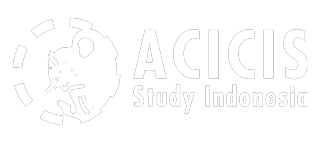By Elena Williams (Semester 20/Feb 2005)
University of Sydney
When I was five years old I tasted my first bowl of nasi goreng at my Darwin primary school’s annual Indonesian Day. I remember thinking it was too sweet, doused in Indonesia’s famous kecap manis (sweet soy sauce); little did I know then that twenty years later I would be living in Indonesia’s very own kota manis, Yogyakarta, and loving the taste of that sweet soy!
I was fortunate enough to study Indonesian at primary school, high school and university, yet it was not until my ‘in-country’ year of study with The Australian Consortium for ‘In-Country’ Indonesian Studies (ACICIS) in Yogyakarta, that my eyes were really opened to Indonesian culture and I was really able to improve my Bahasa.
On my year away with ACICIS I learnt more about Indonesian language and culture than I had in eight years of formal study. I lived in a kos with twenty young Indonesian women which was the perfect introduction to sinetron, gosip, and Indonesian youth culture, studied Indonesian language in Indonesian, and learnt about Indonesian politics in Indonesia. I volunteered with NGOs and student groups and suddenly found myself interpreting and translating documents until the wee hours of the morning. I learnt to ride a motorbike. I rubbed Buddha’s foot at Borobudur. I travelled extensively over Indonesia, practising my language and learning about cultures outside Java. I tried to cook. I tried to speak Javanese. I made incredible contacts for my Honours field research the following year. While the government at home was decreasing its funding for Indonesian Studies, and universities were closing the doors of their Indonesian departments, I was at last experiencing the Indonesia of my text books, videos and final exams for real: and loving every minute of it.
When I returned from my ACICIS year I was granted a scholarship to study Honours in Indonesian at Sydney University. This scholarship allowed me to develop my language further by travelling to Indonesia to conduct field research for my thesis with Indonesian unionists, NGO staff and women activists. Studying and researching ‘in-country’ have been such rewarding experiences, and have opened so many wonderful doors for me: translation and interpreting work with Oxfam Australia, volunteer work with orphanages and schools across Indonesia, participating in the 2007- 2008 Australian Indonesian Youth Exchange Program in Lombok, working as a Research Assistant in Sydney University’s Indonesian Studies Department, and finally, working back with the Keluarga ACICIS in my current role as Program Officer here in Yogyakarta.
Recently, I had the opportunity to represent ACICIS as a youth delegate at the Australian- Indonesian bilateral relations conference in Sydney. Having experienced first hand the effects of the former government’s abandonment for Asian language funding, I welcome the Rudd Government’s $60million commitment to funding Asian languages through the National Asian Languages and Studies in Schools Program (NALSSP), yet feel this funding needs to be drastically increased if the government wishes to achieve its goal of an Asia literate generation by 2020, and if it intends to award more scholarships to young Australian-Indonesian scholars.
From my experience, I have no doubt that the ‘in-country’ experience is the best way for students to experience and understand our nearest neighbour. From interfaith and cross-cultural discussions on campus to watching Indonesian Idol together, living ‘in-country’ allows for a level of cultural immersion and interaction like no other. With an increase in funding for Indonesian Studies in Australia, I hope that more students will be able to study ‘in-country’ on scholarships and continue to break down the many misconceptions between Australian and Indonesian culture over a bowl of bakso or a plate of nasi goreng (with kecap manis, of course).
